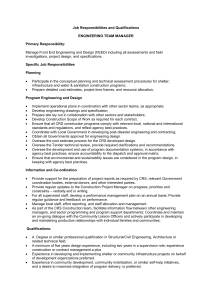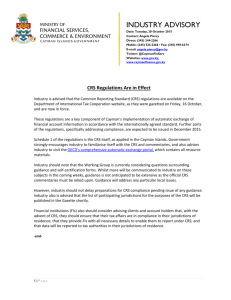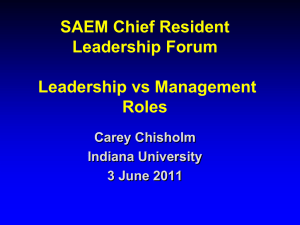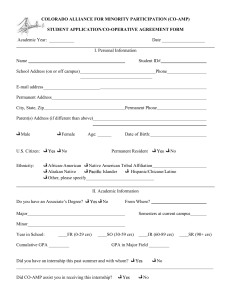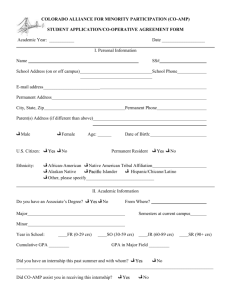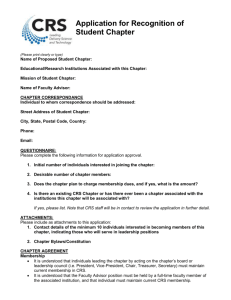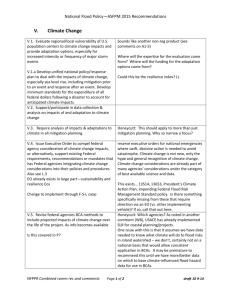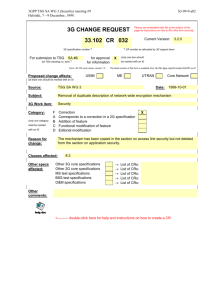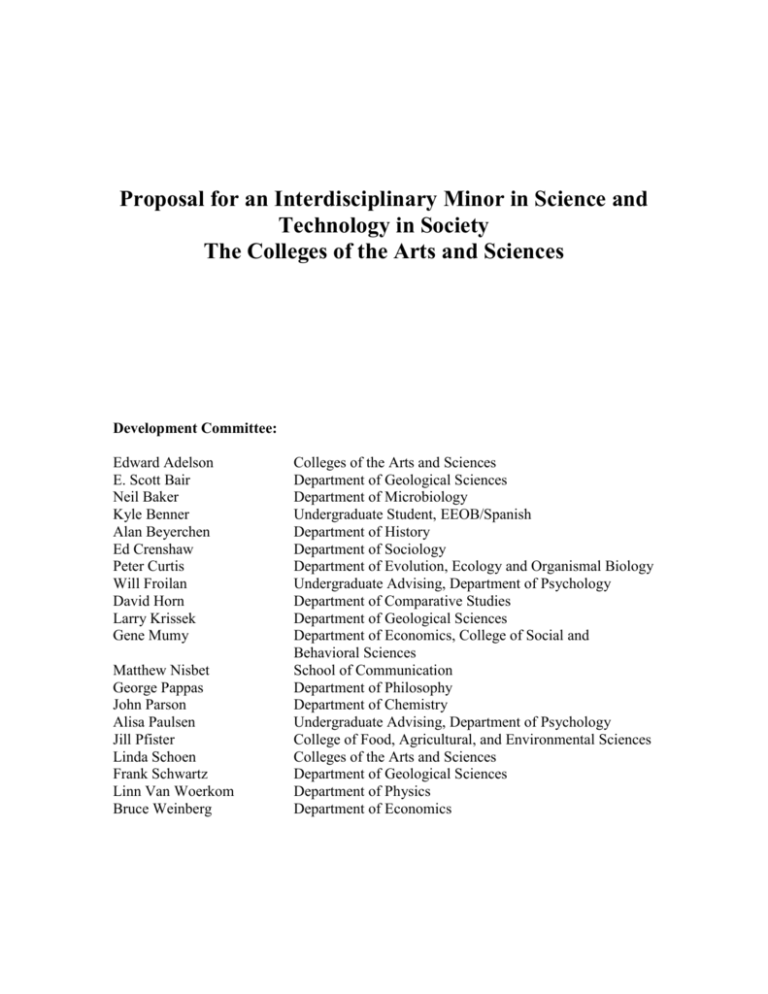
Proposal for an Interdisciplinary Minor in Science and
Technology in Society
The Colleges of the Arts and Sciences
Development Committee:
Edward Adelson
E. Scott Bair
Neil Baker
Kyle Benner
Alan Beyerchen
Ed Crenshaw
Peter Curtis
Will Froilan
David Horn
Larry Krissek
Gene Mumy
Matthew Nisbet
George Pappas
John Parson
Alisa Paulsen
Jill Pfister
Linda Schoen
Frank Schwartz
Linn Van Woerkom
Bruce Weinberg
Colleges of the Arts and Sciences
Department of Geological Sciences
Department of Microbiology
Undergraduate Student, EEOB/Spanish
Department of History
Department of Sociology
Department of Evolution, Ecology and Organismal Biology
Undergraduate Advising, Department of Psychology
Department of Comparative Studies
Department of Geological Sciences
Department of Economics, College of Social and
Behavioral Sciences
School of Communication
Department of Philosophy
Department of Chemistry
Undergraduate Advising, Department of Psychology
College of Food, Agricultural, and Environmental Sciences
Colleges of the Arts and Sciences
Department of Geological Sciences
Department of Physics
Department of Economics
Rev 4/27/06
Proposal for an Interdisciplinary Minor in Science and Technology in Society
This proposal is to establish a new undergraduate minor in Science and Technology in
Society. The minor will enable students, particularly in science and engineering fields, to
investigate, from a variety of disciplinary and interdisciplinary perspectives, the ways
science and technology interact with other aspects of society and culture. The courses in
the minor explore the production of scientific and technical knowledge in varied
historical and cultural contexts; the role of science, technology, and medicine in shaping
modern societies; and the social, political, and ethical implications of new sciences and
technologies. The field of Science, Technology and Science is a recognized academic
discipline that examines these areas. At The Ohio State University, this discipline is
represented in a curricular form presently by the existing undergraduate major
concentration in Science Studies in the Department of Comparative Studies. This minor
parallels curricular offerings in Science, Technology, and Society at other peer
institutions, such as the University of Michigan, the University of Minnesota, and the
University of Texas.
Development of the Minor
An invitation to participate in the development of this interdisciplinary minor was sent to
all chairs and undergraduate studies chairs within the Colleges of the Arts and Sciences.
The resulting structure and curriculum of the minor were developed by a group of
interested faculty and an undergraduate student from the departments of Chemistry;
Comparative Studies; Evolution, Ecology, and Organismal Biology; Geological Sciences;
History; Microbiology; Philosophy; Physics; Psychology; and Sociology, as well as from
the College of Food, Agricultural, and Environmental Sciences. Comments and
suggestions were solicited from the chairs of all academic units with courses listed on the
curriculum, and involvement was encouraged from throughout the Arts and Sciences and
other colleges on campus.
Curriculum
The proposed undergraduate minor in Science and Technology in Society requires
completion of 25 credit hours. Students must successfully complete a foundational
course and one of four core courses. The remaining credit hours may be taken from a
range of advanced courses. Elective coursework must come from at least two different
departments. Elective courses have been categorized to help advise students (see
Appendix A). Dependent on their interests and goals for the minor, students may chose
take advanced courses in a particular topic specialization to complement a major or
across specializations to achieve a breadth across topics as well as disciplines. In
addition, students may not take more than two courses at the 200-level to ensure in-depth
coverage. Students are encouraged to complete their General Education Curriculum
Natural Science requirements prior to embarking on the minor in order to provide some
2
understanding of a science discipline. This minor may complement best majors in
science or engineering fields.
Foundational Course:
All students must take Comparative Studies 272: Science and Society (5 credit hours),
which is classified as a GEC Arts and Humanities-Culture and Ideas course. This course
introduces students to core concepts within the field of science, technology and culture.
This course also serves as the foundational course for the concentration in Science
Studies. Comparative Studies 272 is taught one quarter per year with a limit of 45 seats.
In the last two years, there have been 10-13 open seats. Enrollment will be monitored to
assess if there is adequate seat availability after the creation of the minor.
Core Courses:
Students are required to take one of following:
Comp Std 597.01
Phil 455
Physics 367
Soc 302
Global Studies of Science and Technology (GEC Contemporary
World) (5 crs)
Philosophy of Science (5 crs)
Uses of Science in Solving Problems of Society (GEC 2nd level
Writing; Physical Science) (5 crs)
Technology and Global Society (5 crs)
These core courses provide students with a further foundation in different aspects of the
science and society field, for example, in the philosophy or history of science.
Philosophy 455, Physics 367, and Sociology 302 are offered one quarter per year.
Comparative Studies 597.01 is offered every quarter. It is not expected that students will
encounter any barriers in registering for core courses as there are multiple options for this
requirement.
Electives:
Students must complete an additional 15 hours from the courses listed below.
Coursework must come from two different academic units. Courses are categorized into
specialization areas to assist students in choosing courses to meet their interests or
complement their major (see Appendix A for a listing of courses categorized by academic
unit). Students may elect to take any combination of courses listed below in order to
reflect their particular academic interests. Prerequisites (listed in Appendix C) may be
waived for minors, so students are advised to consult regularly with their advisor.
Environmental/Ecological Issues
Anthro 610
ARCH 700
CRP 722
Ethnobotany (5 crs)
Allied Arts: Green Matters (3 crs)
Introduction to Analysis and Use of Environmental Factors in City
3
CRP 724
Ent 460
Ent 531
EEOB 370
EEOB 502
Geo Sci 203
Geo Sci 204
Geo Sci 210
Hist 366
Hist 567
LARCH 597
Microbio 301
Microbio 509
Nat Res 400
Phil 533
Physics 367
Soc 460
and Regional Planning (3 crs)
Introduction to Planning for Sustainable Development (4 crs)
Economic Entomology and Insect Pest Management (5 crs)
Pesticides, the Environment, and Society (3 crs)
Extinction (3 crs)
Plants and People (4 crs)
Geology and the Environment (GEC phys sci) (5 crs)
Water Resources (5 crs) (Exploring Water Issues-new title
proposed)
Energy and Mineral Resources in Society (GEC phys sci) (5 crs)
Global Environmental History (5 crs)
American Environmental History (5 crs)
Stewardship Issues in Environmental Design and Development
(GEC Contemporary World) (5 crs)
The Biology of Pollution (2 crs)
Basic and Practical Microbiology (GEC Biological Science) (5 crs)
Natural Resources Policy (GEC Social Science-Organizations &
Polities) (5 crs)
Environmental Ethics (5 crs)
Uses of Science in Solving Problems of Society (GEC 2nd Level
Writing; Physical Science) (5 crs)
Environmental Sociology (5 crs)
Ethical, Political, and Policy Issues
Gender and Science (cross-listed with Women’s Studies 535) (5
crs)
COM 341
Introduction to Telecommunications and Electronic Media
Theories and Policies (5 crs)
COM 659
Communication Systems and Society (5 crs)
COM 666
Communication Perspectives on Contemporary Cultural Products
(5crs)
CRP 724
Introduction to Planning for Sustainable Development (4 crs)
EEOB 710
Creation and Evolution: Differing World Views (5 crs)
Intl St 554
Science, Technology and the Cold War (5 crs)
Nat Res/LARCH 367 The Making and Meaning of the American Landscape (GEC 2nd
Writing, Arts & Humanities-Culture & Ideas for BS degree only)
(5 crs) (Cross-listed in Landscape Architecture)
Phil 533
Environmental Ethics (5 crs)
Phil H580
Ethical Conflicts in Health Care Research, Policy, and Practice
(cross-listed with Nursing 580) (5 crs)
Women’s St 535
Gender and Science (5 crs)
Comp Std 535
Food and Population Issues
AED Econ 335
Feast or Famine: The Global Business of Food (5 crs)
4
(cross-listed in International Studies)
AED Econ 597.01
Problems and Policies in World Population, Food, and
Environment (GEC Contemporary World) (5 crs) (cross-listed with
International Studies 597.01)
Hort & Crop Sci 200 Crop Science (GEC bio sci) (5 crs)
Hort & Crop Sci 597 Issues in Biotechnology (GEC Contemporary World) (5 crs)
Intl St 335
Feast or Famine: The Global Business of Food (5 crs)
(cross-listed in AED Econ)
Intl St 597.01 (H)
Problems and Policies in World Population, Food, and
Environment (GEC Contemporary World) (5 crs) (cross-listed with
AED Econ 597.01)
Soc 597.02
World Population Problems (5 crs)
Health Care Resources and Medical Technologies
Anthro 601
Anthro 601.01
Anthro 601.04
Classics 230
Comp Std 305
Hist 562
Phil H580
Soc 450
Women’s St 325
Medical Anthropology (5 crs)
Biosocial Aspects of Health
Global Perspectives on Women’s Health
Medicine in the Ancient World (5 crs)
Medicine and the Humanities (GEC Arts & Humanities-Culture &
Ideas) (5 crs)
History of American Medicine (5 crs)
Ethical Conflicts in Health Care Research, Policy, and Practice
(cross-listed with Nursing 580) (5 crs)
Illness and Social Behavior (5 crs)
Issues in Women’s Health (5 crs)
History of Science and Scientific Development
ARCH 601
ARCH 602
Classics 230
Classics 324
Classics 506
CRP 643
Hist 366
Hist 513.01
Hist 513.02
Hist 561
Hist 562
Hist 567
Phil 455
Phil 460
Phil 655
History of Architecture: Renaissance to Crystal Palace (4 crs)
History of Modern Architecture (4 crs)
Medicine in the Ancient World (5 crs)
Magic in the Ancient World (5 crs)
Greek and Roman Science and Technology (5 crs)
American City Planning since 1900 A.D. (4 crs)
Global Environmental History (5 crs)
The Age of Modernity in the 19th Century (5 crs)
The Age of Modernity in the 20th Century (5 crs)
History of American Science (5 crs)
History of American Medicine (5 crs)
American Environmental History (5 crs)
Philosophy of Science (5 crs)
Introduction to Theory of Knowledge (5 crs)
Advanced Philosophy of Science (5 crs)
5
Interaction of Technology and Society
Anthro 597.04
The Molecular Revolution: Heredity, Genome Mapping, and
Genomania (GEC Contemporary World) (5 crs)
COM 240
Introduction to Communication Technology (5 crs)
COM 640
Science Communication (5 crs)
COM 654
Social Implications of Telecommunications and Electronic Media
Structures (5 crs)
Comp Std 204/H204 Literature, Science, and Technology (GEC Arts & Humanities –
Literature) (5 crs)
Comp Std 367.02/
H367.02
Comp Std 597.01
CRP 310
Eng 367
Intl St 554
Psych 695.04
Soc 302
Science and Technology in American Culture (GEC 2nd Writing)
(5 crs)
Global Studies of Science and Technology (GEC Contemporary
World) (5 crs)
Introduction to City and Regional Planning (4 crs)
American Attitudes about Technology (GEC 2nd Writing) (5 crs)
Science, Technology and the Cold War (5 crs)
Seminars in Psychology: Technology, Efficiency, and Happiness
(2 crs)
Technology and Global Society (5 crs)
See Appendix F for examples of syllabi from both foundational and advanced elective
courses.
Administration and Advising
The minor will be listed in the OSU Bulletin as “an interdisciplinary minor offered
by The Colleges of the Arts and Sciences.” An interdisciplinary Faculty Advisory
Committee will be formed with representatives from the major departments offering
coursework within the minor and will include a representative from the university
academic advising community. The Committee will be appointed by the Associate
Executive Dean of the Colleges of the Arts and Sciences according to the guidelines
approved for interdisciplinary programs by the Colleges of the Arts and Sciences
Committee on Curriculum and Instruction (CCI). This committee will evaluate the minor
curriculum and course offerings and meet at least once per year in order to make
recommendations to the CCI Subcommittee A regarding policy rules, the addition of
courses to the minor, the status of the minor, and the assessment of learning outcomes.
The CCI will have curricular oversight of the program.
Active advising is essential to students reaping the greatest benefits from this curricular
program. Advising will be done by professional departmental advisors, in conjunction
with Arts and Sciences advisors. The minor will be administered through the Colleges of
the Arts and Sciences Office of Interdisciplinary Programs, which will coordinate and
disseminate program materials, facilitate and support the work of the Faculty Advisory
6
Committee, and resolve any student issues. Program materials will be available through
the Arts and Sciences Curriculum Office, the Arts and Sciences Advising Service, and
through the interdisciplinary program website of the Colleges of the Arts and Sciences.
Advisors, in particular those within the Arts and Sciences Advising mathematical and
science cluster, will be provided with any needed education re the requirements of the
minor and the selection of courses.
Enrollment Projection
It is expected that this minor will be attractive to a wide variety of majors, but
specifically students within science and technology majors. It is expected that students
majoring within the biological, physical, and health sciences, as well as those in
engineering and agricultural fields may find this minor attractive. The minor will be
advertised to students via several ways: through the creation of a minor requirement
sheet maintained by the Colleges of the Arts and Sciences Curriculum Office, which will
be circulated to advisors and relevant faculty, through the posting of curricular
information on the Office of Interdisciplinary Programs within the Colleges of the Arts
and Sciences website, and through establishing links on participating departments’
websites. It is expected that the minor will initially attract a total of 20-30 students and
grow to attract 10-15 sophomores and 5 upper-class students per year within five years.
The Faculty Advisory Committee will monitor growth of student participation in the
minor and make recommendations about possible increases in seat availability.
Student Learning Outcome Assessment Plan
The specific student learning goals for this minor include:
1. Students should be able to articulate an understanding of scientific method and the
protocols of science.
2. Students should be able to articulate an awareness of the impact of science and
technology on society.
3. Students should be able to articulate an understanding of the ways in which
societal problems drive developments in science and technology.
Assessment Plan:
The Faculty Advisor Committee will be charged with assessing student learning
outcomes. Initially, a focus group of junior and senior students will be convened in the
Spring Quarter. To be included in the group, students must have completed at least three
courses within the minor, including the foundational course and one of the core courses.
The group will explore student perceptions of: (1) the attainment of the above goals, and
(2) the structure, availability, and sequencing of courses in the minor. As enrollments
increase, graduating seniors only will be assessed and survey methodology will be
employed. In addition, the Faculty Advisory Committee will analyze the enrollment
7
pattern within the minor on a yearly basis and address any issues affecting enrollment.
The annual report which will include assessment information will be submitted to the
Arts and Sciences Committee on Curriculum and Instruction Subcommittee A and to the
participating faculty and academic units.
Resources
Current facilities and staff resources are adequate to support this minor. The
interdisciplinary cooperation of units allows students to benefit from the resources that
exist in disparate units in such a way that enhances the networking amongst units.
Students may take advantage of the unique interdisciplinary nature of the field of science,
technology, and society and the many existing courses that already exist at The Ohio
State University.
Expenses
Current faculty levels are adequate to staff the courses as the minor relies on existing
courses for foundational and advanced courses. As the minor aids in connecting
interested students to specific courses, it is expected that new courses can be developed
as there will be a body of students to populate them. Our current budgetary system
should reinforce the development of new courses as the interested student body grows.
See Appendix B for a listing of faculty who regularly teach courses and conduct research
in this area.
Competitiveness With Other Institutions
With the development of a minor, Ohio State joins a number of its benchmark and peer
institutions that have programs, majors, or minors in this area. Existing programs within
Ohio have not been found, yet similar programs are offered, for example, at the
University of Michigan, the University of Minnesota, and at the University of Texas. See
Appendix D for sample programs at other institutions.
Administrative Support for the Minor
The establishment of this minor is supported at various levels. It has the support of the
Executive Dean of the Colleges of Arts and Sciences, Jacqueline Royster. Additional
program concurrence and support has been obtained from many academic units and
administrators (see Appendix E).
Implementation Date
The minor in Science and Technology in Society is proposed for implementation in
Autumn Quarter 2006.
8
APPENDIX A: Elective Courses Categorized by Academic Unit
Elective Coursework
Students must complete an additional 15 hours from the courses listed below.
Coursework must come from two different academic units. Courses are categorized for
student interest and advising purposes. Students may elect to take any combination of
courses listed below that reflect their particular academic interests.
Agricultural, Environmental, and Developmental Economics
AED Econ 335
Feast or Famine: The Global Business of Food (5 crs)
(cross-listed in International Studies)
AED Econ 597.01
Problems and Policies in World Population, Food, and
Environment (GEC Contemporary World) (5 crs) (cross-listed with
International Studies 597.01)
Anthropology
Anthro 597.04
Anthro 601
Anthro 601.01
Anthro 601.04
Anthro 610
The Molecular Revolution: Heredity, Genome Mapping, and
Genomania (GEC Contemporary World) (5 crs)
Medical Anthropology (5 crs)
Biosocial Aspects of Health
Global Perspectives on Women’s Health
Ethnobotany (5 crs)
Architecture
ARCH 601
ARCH 602
ARCH 700
History of Architecture: Renaissance to Crystal Palace (4 crs)
History of Modern Architecture (4 crs)
Allied Arts: Green Matters (3 crs)
City and Regional Planning
CRP 310
Introduction to City and Regional Planning (4 crs)
CRP 643
American City Planning since 1900 A.D. (4 crs)
CRP 722
Introduction to Analysis and Use of Environmental Factors in City
and Regional Planning (3 crs)
CRP 724
Introduction to Planning for Sustainable Development (4 crs)
Classics
Classics 230
Classics 324
Classics 506
Communication
COM 240
COM 341
COM 640
Medicine in the Ancient World (5 crs)
Magic in the Ancient World (5 crs)
Greek and Roman Science and Technology (5 crs)
Introduction to Communication Technology (5 crs)
Introduction to Telecommunications and Electronic Media
Theories and Policies (5 crs)
Science Communication (5 crs)
9
COM 654
COM 659
COM 666
Social Implications of Telecommunications and Electronic Media
Structures (5 crs)
Communication Systems and Society (5 crs)
Communication Perspectives on Contemporary Cultural Products
(5 crs)
Comparative Studies
Comp Std 204/H204 Literature, Science, and Technology (GEC Arts & Humanities –
Literature) (5 crs)
Comp Std 305
Medicine and the Humanities (GEC Arts & Humanities-Culture &
Ideas) (5 crs)
Comp Std 367.02/
H367.02
Comp Std 535
Comp Std 597.01
Science and Technology in American Culture (GEC 2nd Writing)
(5 crs)
Gender and Science (cross-listed with Women’s Studies 535) (5
crs)
Global Studies of Science and Technology (GEC Contemporary
World) (5 crs)
Engineering
Eng 367
American Attitudes about Technology (GEC 2nd Writing) (5 crs)
Entomology
Ent 460
Ent 531
Economic Entomology and Insect Pest Management (5 crs)
Pesticides, the Environment, and Society (3 crs)
Evolution, Ecology, and Organismal Biology
EEOB 370
Extinction (3 crs)
EEOB 502
Plants and People (4 crs)
EEOB 710
Creation and Evolution: Differing World Views (5 crs)
Geological Sciences
Geo Sci 203
Geology and the Environment (GEC phys sci) (5 crs)
Geo Sci 204
Water Resources (5 crs) (Exploring Water Issues-new title
proposed)
Geo Sci 210
Energy and Mineral Resources in Society (GEC phys sci) (5 crs)
History
Hist 366
Hist 513.01
Hist 513.02
Hist 561
Hist 562
Hist 567
Global Environmental History (5 crs)
The Age of Modernity in the 19th Century (5 crs)
The Age of Modernity in the 20th Century (5 crs)
History of American Science (5 crs)
History of American Medicine (5 crs)
American Environmental History (5 crs)
10
Horticulture and Crop Science
Hort & Crop Sci 200 Crop Science (GEC bio sci) (5 crs)
Hort & Crop Sci 597 Issues in Biotechnology (GEC Contemporary World) (5 crs)
International Studies
Intl St 335
Feast or Famine: The Global Business of Food (5 crs)
(cross-listed in AED Econ)
Intl St 554
Science, Technology and the Cold War (5 crs)
Intl St 597.01 (H)
Problems and Policies in World Population, Food, and
Environment (GEC Contemporary World) (5 crs) (cross-listed with
AED Econ 597.01)
Landscape Architecture
LARCH 367
The Making and Meaning of the American Landscape (GEC 2nd
Writing, Arts & Humanities-Culture & Ideas for BS degree only)
(5 crs) (Cross-listed in Natural Resources)
LARCH 597
Stewardship Issues in Environmental Design and Development
(GEC Contemporary World) (5 crs)
Microbiology
Microbio 301
Microbio 509
Natural Resources
Nat Res 367
Nat Res 400
Philosophy
Phil 455
Phil 460
Phil 533
Phil H580
Phil 655
Physics
Physics 367
Psychology
Psych 695.04
The Biology of Pollution (2 crs)
Basic and Practical Microbiology (GEC Biological Science) (5 crs)
The Making and Meaning of the American Landscape (GEC 2nd
Writing, Arts & Humanities-Culture & Ideas for BS degree only)
(5 crs)
Natural Resources Policy (GEC Social Science-Organizations &
Polities) (5 crs)
Philosophy of Science (5 crs)
Introduction to Theory of Knowledge (5 crs)
Environmental Ethics (5 crs)
Ethical Conflicts in Health Care Research, Policy, and Practice
(cross-listed with Nursing 580) (5 crs)
Advanced Philosophy of Science (5 crs)
Uses of Science in Solving Problems of Society (GEC 2nd Level
Writing; Physical Science) (5 crs)
Seminars in Psychology: Technology, Efficiency, and Happiness
(2 crs)
11
Sociology
Soc 302
Soc 450
Soc 460
Soc 597.02
Technology and Global Society (5 crs)
Illness and Social Behavior (5 crs)
Environmental Sociology (5 crs)
World Population Problems (5 crs)
Women’s Studies
Women’s St 325
Women’s St 535
Issues in Women’s Health (5 crs)
Gender and Science (5 crs)
12
APPENDIX B: FACULTY
Faculty listed below have research and/or teaching interests in Science, Technology, and
Society or related areas at The Ohio State University.
Neil Baker
James R. Bartholomew
Robert Batterman
Alan Beyerchen
Brenda Jo Brueggerman
Timothy Choy
Maria Manta Conroy
Ed Crenshaw
Peter Curtis
John Finer
Katharine Flores
Jacqueline Gargus
Claudio Gonzalez-Vega
David Horn
Motomu Ibaraki
Shahrukh A. Irani
Richard Jagacinski
Nancy Jesser
Pablo Jourdan
Stephen Kern
Gary Kinzel
Seppo Korpela
Lawrence Krissek
Blaine Lilly
Garry McKenzie
Gene Mumy
Matthew Nisbet
John Parson
Douglas Pride
John Simpson
Douglas Southgate
Maurice Stevens
Lonnie Thompson
Lisa Tilder
Thuy Linh Tu
BruceWeinberg
Kristi Williams
Department of Microbiology
Department of History
Department of Philosophy
Department of History
Department of English
Department of Comparative Studies
Austin E. Knowlton School of Architecture
Department of Sociology
Department of Evolution, Ecology & Organismal
Biology
Department of Horticulture and Crop Science
Department of Materials Science and Engineering
Austin E. Knowlton School of Architecture
Department of Agricultural, Environmental, and
Developmental Economics
Department of Comparative Studies
Department of Geological Sciences
Department of Psychology
Department of Comparative Studies
Department of Horticulture and Crop Science
Department of History
Department of Mechanical Engineering
Department of Mechanical Engineering
Department of Geological Sciences
Department of Industrial, Welding, and Systems
Engineering
Department of Geological Sciences
Department of Economics
School of Communication
Department of Chemistry
Department of Geological Sciences
Austin E. Knowlton School of Architecture
Department of Agricultural, Environmental, and
Developmental Economics
Department of Comparative Studies
Department of Geological Sciences
Austin E. Knowlton School of Architecture
Department of Comparative Studies
Department of Economics
Department of Sociology
13
Linn Van Woerkom
Victoria Wohl
Department of Physics
Department of Greek and Latin
14
APPENDIX C: Prerequisites for Courses
Foundational Course
Comp Std 272
English 110 or equivalent
Core Courses
Comp Std 597.01
Phil 455
Physics 367
Soc 302
Sr standing and completion of GEC 2nd writing course.
quantitative and logical skills req, and natural science sequence or
perm
Phil 250 and either major or 15 crs of Phil (may be waived)
Math Placement S or higher; 1 5-hr 100-level course in either
astron, bio sci, geol sci, or physics; English 110 or 111 or equiv
None
Electives
Agricultural, Environmental, and Developmental Economics
AED Econ 335
None
AED Econ 597.01
None
Anthropology
Anthro 597.04
Anthro 601.01
Anthro 601.04
Anthro 610
Jr or Sr standing
None
Anthro 200 or permission of instructor
One course I anthro or plant bio at the 200-level or above or perm
Architecture
ARCH 601
ARCH 602
ARCH 700
None
None
Arch 4th year or grad standing or permission of instr
City and Regional Planning
CRP 310
None
CRP 643
None
CRP 722
CRP 745 or permission of instr
CRP 724
None
Classics
Classics 230
Classics 324
Classics 506
None
None
None
Communication
COM 240
COM 341
COM 640
COM 654
None
Journalism or communication major
Jr or Sr standing
Journalism or communication major or perm
15
COM 659
COM 666
Comparative Studies
Comp Std 204/H204
Comp Std 367.02/
H367.02
Comp Std 305
Comp Std 535
Comp Std 597.01
Journalism or communication major or perm
Journalism or communication major or perm
English 110 or equivalent
English 110 or equivalent, and soph standing
Soph standing and English 110 or equiv
One course in comp std or wom stds
Sr standing and completion of GEC 2nd writing course.
quantitative and logical skills req, and natural science sequence or
perm
Engineering
Eng 367
English 110 or 111 and soph standing
Entomology
Ent 460
Ent 531
Biology 101 or 113 or H115
5 crs in organic chem. & 10 in bio sci at 200 –level)
Evolution, Ecology, and Organismal Biology
EEOB 370
5 crs of biological sciences course work
EEOB 502
5 cr hrs of biological sciences
EEOB 710
10 cr hrs of biology
Geological Sciences
Geo Sci 203
Geo Sci 100 or 121
Geo Sci 204
Geo Sci 121
Geo Sci 210
Geo Sci 100 or 121
History
Hist 366
Hist 513.01
Hist 513.02
Hist 561
Hist 562
Hist 567
None
None
None
Jr standing
None
Soph standing
Horticulture and Crop Science
Hort & Crop Sci 200 Bio 101 or Bio 113 or Plant Bio 101
Hort & Crop Sci 597 Bio 101 or Bio 113 or Plant Bio 101 or equiv, snr standing
International Studies
Intl St 335
None
Intl St 554
None
Intl St 597.01 (H)
None
16
Landscape Architecture
LARCH 597
Senior standing
Microbiology
Microbio 301
Microbio 509
None
Bio 101or 113 or H115 or 201
Natural Resources
Nat Res 367
Nat Res 400
English 110 or 111 or equiv
Nat Res 201 & 203
Philosophy
Phil 455
Phil 460
Phil 533
Phil H580
Phil 655
Symbolic Logic and major or 15 hrs of phil
major or 15 hrs of phil
Phil 130 or 431 or perm
Phil 130
Phil 250 and 10 crs of phil
Physics
Physics 367
Psychology
Psych 695.04
Sociology
Soc 302
Soc 450
Soc 460
Soc 597.02
Women’s Studies
Women’s St 325
Women’s St 535
Math Placement S or higher; 1 5-hr 100-level course in either
astron, bio sci, geol sci, or physics; English 110 or 111 or equiv
Written permission of instructor
None
5 cr hrs in sociology
Soc 101 or perm of instr
5 cr hrs of social science course work, GEC data analysis
requirement
5 cr hrs of wom stds course work or perm
One course in comp std or wom stds
17
APPENDIX D: SIMILAR PROGRAMS AT OTHER INSTITUTIONS
Students
Faculty & Staff
Departments & Units
Research
People Directory
Alumni & Friends
Course Guide
Parents
LSA Events
LSA News
About LSA
Home > Course Guide > LSA Bulletin > Chapter VI: Departments, Programs, and Courses > Residential College > Academic
Minors > Bulletin: Residential College of Literature, Science, and the Arts Academic Minors: Science, Technology, and Society
Bulletin: Residential College of Literature, Science, and the Arts Academic
Minors: Science, Technology, and Society
Science, Technology & Society
effective date of academic minor: February 17, 2001
Students wishing to pursue an academic minor in Science, Technology, and Society must
develop a specific plan for its completion in consultation with the program's designated
advisor. Appointments may be scheduled by sending email to
mailto:sts.minor.advisor@umich.edu Students may not declare the STS minor later than
the first week of the first term of their senior year.
No course may be counted simultaneously toward both STS and any other
academic minor.
Courses on science, technology, and society are offered by many different departments
and programs in LS&A as well as in other colleges of the university. Only courses
specifically approved by the STS Program may be counted toward the minor. There are
presently no provisions for exceptions to this rule. An up-to-date list of currently approved
courses is available at the STS Program web site.
Prerequisites to the Academic Minor: None for the Academic Minor per se, although
individual courses elected to meet the requirements of the Academic Minor may have
course prerequisites.
Academic Minor Program: At least 5 courses for a minimum of 18 credits of courses, to
be elected from the categories as stated below:
18
A. Core course: Residential College Nat Sci 275. Social Dynamics of Science,
Technology, and Medicine.
B. Electives. A minimum of 3 courses for at least 11 credits, subject to the following
conditions:
A maximum of one elective at the 100 level is permitted (up to 4 credits).
At least two electives must be at the 300 level or above.
Students may also count any research seminar (see below) as an elective.
At least two of the student's three electives must be drawn from one of the focus clusters:
science and society, technology and society, or medicine and society.
Science and Society Focus Cluster
ANTHRBIO
360 Race and Human
Evolution
361 Biology, Society,
and Culture
362 Problems of
Race
AOSS
300 Global
Environmental
Impact of
Technological
Change
BIOLOGY
101 Biology and
427 Magic, Science
and Religion in Early
Modern England
591, section subtitled
"Science and Society
in Early Modern
Europe"
HONORS
252, Sophomore
Seminar, section
subtitled "Numbers
and Reasons"
NRE
270 Our Common
Future: Ecology,
Economics & Ethics
19
Technology
and Society
Focus Cluster
Medicine
and Society
Focus
Cluster
AOSS
ANTRHCUL
300 Global
Environmental
Impact of
Technological
Change
258, section
subtitled
"Culture and
Medicine"
BIOLOGY
140 Genetics
and Society
ENGLISH
415
Interdisciplinary
Approaches to
Literature,
section
subtitled
"Research and
Technology in
325
Anthropology
of Childbirth
416 Global
Health
444 Medical
Anthropology
BIOLOGY
118 AIDS
and Other
Health Crises
Human Affairs
140 Genetics and
Society
CHEM
120 First-Year
Seminar, section
subtitled "The History
and Philosophy of
Chemistry"
EEB
498 Ecology of
Agroecosystems
ENVIRON
212 Introduction to
Global Change III:
Studies of Global
Sustainability
270 Our Common
Future: Ecology,
Economics & Ethics
of Sustainable
Development
HISTORY
285 Science,
Technology and
Society: 1940 to the
Present
the
Humanities"
of Sustainable
Development
HISTORY
PHYSICS
281 Physics and
National Science
Policy
285 Science,
Technology and
Society: 1940
to the Present
Residential
College
SI
RCNSCI 232 History
of Life
110
Introduction to
Information
Studies
RCNSCI 250 Ecology,
Development, and
Conservation in the
New World Tropics
(taught in Spanish)
RCNSCI 260 Science
and Societal Issues:
The Immune System
RCNSCI 343
Scientific Change
RCSSCI 360, section
subtitled "Exploring
the Boundary
between Science and
Politics"
513 Women
and
Informaiton
Technology
SOC
110
Introduction to
Information
Studies
UP
263 Energy,
Environment,
and the City
WOMENSTD
483 Special
Topics, section
entitled
"Women and
Information
Technology"
301 Discovery of the
Universe
302 Topics in History,
20
CAAS
355 Health
and Illness in
African
Worlds
HISTORY
284 Sickness
and Health in
Society, 1492
to Present
355 Health
and Illness in
African
Worlds
MEDCARE
475
Introduction
to Medical
Sociology
SOC
475
Introduction
to Medical
Sociology
WOMENSTD
324
Anthropology
of Childbirth
Residential
College STS
Program
Residential
College STS
Program
section entitled
"Science, Technology
and Defining the
Human"
RCIDIV 330
Information
Technology and
Global Politics
366 American
Science/American
Culture
RCIDIV 430
Perspectives on
High
Technology
Society
397 History
Colloquium, section
entitled "Human
Nature and Its
Sciences"
RCIDIV 450
Science and
Social
Responsibility
RCNSCI 263
Energy,
Environment,
and the City
RCNSCI 270
New
Biotechnology:
Scientific,
Social, and
Historical
Perspectives
RCNSCI 419
Sustainable
Energy Systems
RCSSCI 271
Technology,
Politics, and
Culture
RCSSCI 382
21
RCNSCI 260
Science and
Societal
Issues,
section
entitled
"From
Shamans to
Cyborgs:
SocioCultural
Studies of
Health,
Illness, and
the
Biomedical
Sciences"
and other
topics as
appropriate.
History of Time
C. One research course or seminar, at the 300- or 400-level, in the student's chosen
focus cluster, chosen in consultation with and approved by the advisor. The research
course or seminar will normally be completed in the student's junior or senior year. To be
approved for this requirement, a course must include a major research project (typically a
long term paper) or a significant field study component.
Approved STS Research Courses and Seminars
SUBJECT
Track(s)
Research Seminar
ENVIRON
Technology
ENVIRON
Science
HISTORY
Medicine
318 Food, Land, and Society
414 Science and Politics
Science
396, 397 Colloquium,
section subtitled "Health
and Medicine in US Culture
since 1875" and other
colloquia, if appropriate
HISTORY
Technology
379 History of Computers
and Networks
HISTORY
Technology
497 Technology,
Colonialism, and
Development
HONORS
Medicine
Science
370 (section subtitled "The
Rhetoric of Evidence in
Research')
PHYSICS
All
481 Physics and National
Science Policy
RCCORE
All
405 Senior Independent
Study, taken with a member
of the STS Program core
faculty
RCIDIV
Technology
RCNSCI
Science
RCSSCI
Technology
374 Race, Gender and
Empire in the Nuclear Age
RCSSCI
Technology
379 History of Computers
and Networks
318 Food, Land, and
Society.
415 Science and Politics
22
RCSSCI
Technology
488 Technology,
Colonialism, and
Development
D. Science/Technology/Medicine cognate (lab based). Students electing this
academic minor must complete one cognate, consisting of a laboratory-based course in a
natural science, computer science, or engineering. This cognate may count toward the
LS&A distribution requirement (if it is approved for that requirement). Ideally, this course
should relate to the student's chosen focus cluster.
Content Author(s): lsa saa at:rcj
College of Literature, Science, and the Arts
500 S. State Street, Ann Arbor, MI 48109
© 2002 Regents of the University of Michigan
23
Return to: U
One Stop | Directories | Searc
CLA : Undergraduate Catalog : Catalogs H
Enter Search Terms
Advanced Search
History of Science and Technology
Program in History of Science and Technology
Courses
College of Liberal Arts (CLA) :
Catalog
Web Site
Advising
Majors & Minors
University Policies
General Academic & Campus
Information
Faculty & Administration
Order or Download a Catalog
Catalog Archives
Frequently Asked Questions
Contact Us
Minor Only
Courses for this minor address the history of science and technology, including
the cultural and social contexts of their development.
Requirements
Students take at least 14 credits of 3xxx-5xxx HSci courses; at least 3 of these
credits must be at or above 4xxx. Not more than 25 percent of the total 3xxx5xxx credits in the minor program may consist of directed study, directed
instruction, or independent study credits. All courses in the minor must be
completed with a grade of C- or better.
Courses—For course descriptions, see University courses.
College of Liberal Arts
Undergraduate Admissions
Undergraduate Application
International Students
Financial Aid & Tuition
Office of the Registrar
24
Academic Calendars
©2002 Regents of the University of Minnesota. All rights reserved.
The University of Minnesota is an equal opportunity educator and employer.
25
Trouble seeing the text? | Contact U of M
Last modified on June
Home
NEW:
Key Trends in
information
technology: World
Congress on
Information
Technology taps into
student talents
Support STS
Site Map
UT Home
Accessibility
Credits/Site Info
Welcome to the UT STS Program!
What is STS?
Science, Technology and Society is an interdisciplinary concentration in the
College of Liberal Arts. Our goal is to explore the social impacts of rapid scientific
and technological change by integrating approaches from the liberal arts, social
sciences, and humanities with developments in science and technology.
Key areas of study for STS include:
- Nanotechnology
- Gaming
- Collaborative work and work-life
- Education
- Bio-health
- Computer-mediated communication
back to top
copyright 1998-2004 Science, Technology & Society | University of Texas at Austin
created and maintained by Manoj Thomas
26
APPENDIX E:
Program Concurrence Forms
27
APPENDIX F:
Syllabi
28

